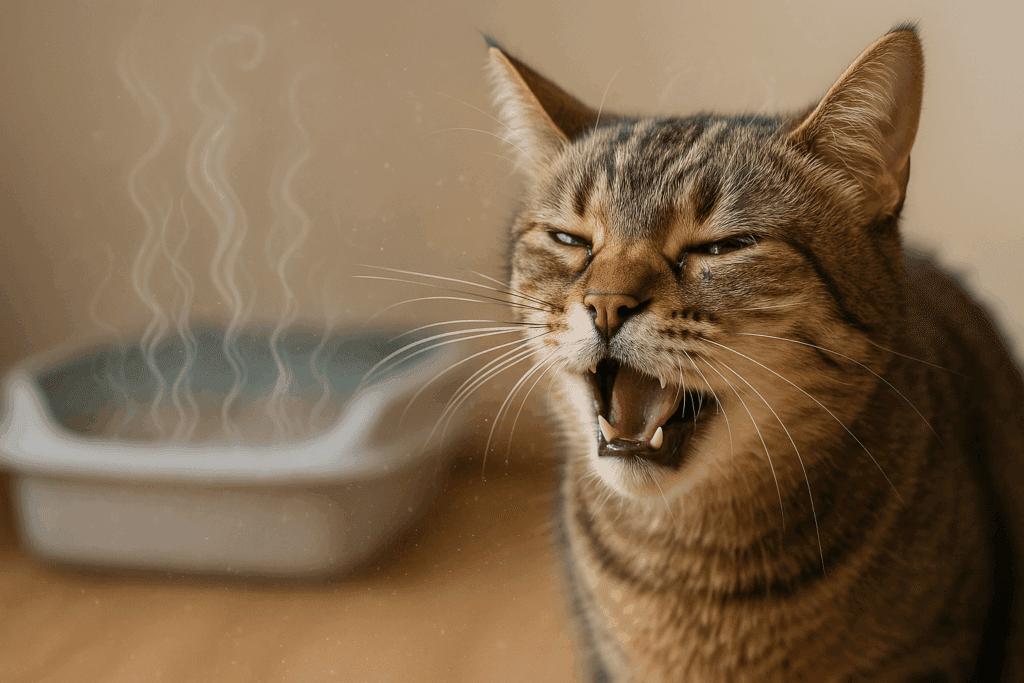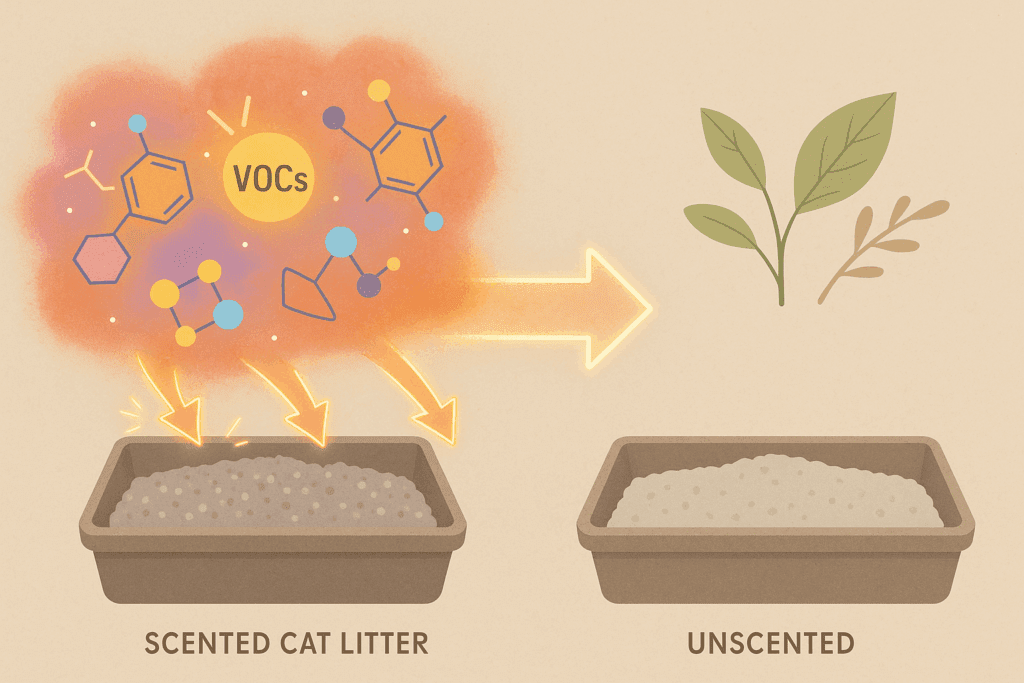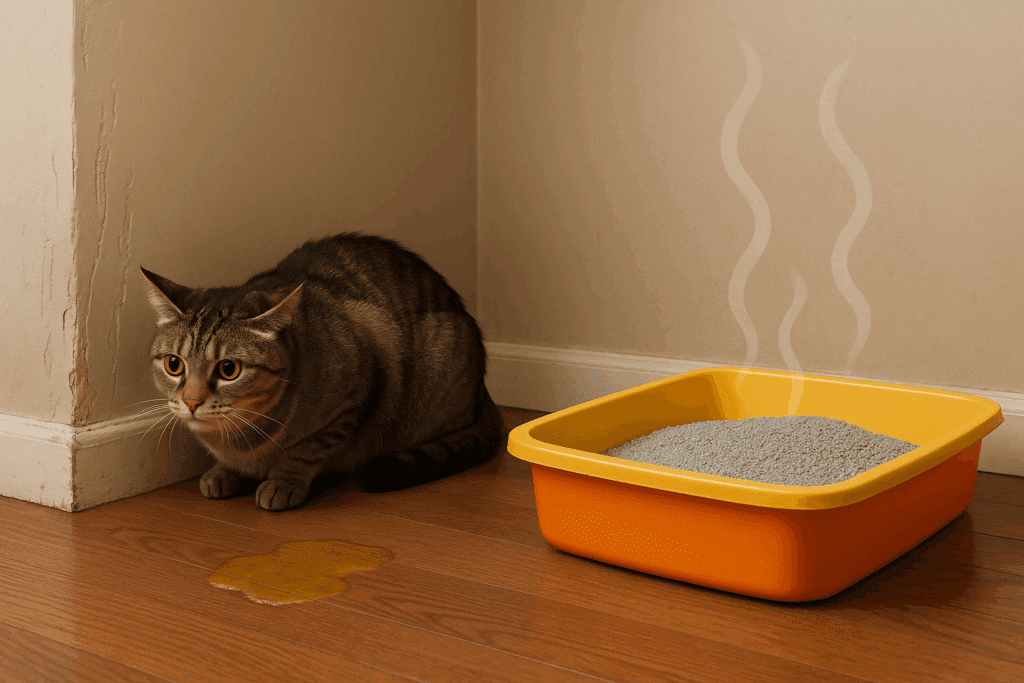In this final piece, we explore Dr. Elsey’s bold vision of a future free from scented cat litter. This forward-thinking article discusses how Dr. Elsey’s efforts are reshaping the industry, advocating for healthier, scent-free alternatives that prioritize cat welfare. Dr. Elsey’s groundbreaking work aims to revolutionize pet care standards for generations to come, offering a new path to feline wellness.
The Hazards of Scented Cat Litter
Cats, with their small bodies and sensitive biology, are especially vulnerable to environmental toxins. One of the key concerns with scented cat litter is the introduction of artificial fragrances, many of which are composed of volatile organic compounds (VOCs). According to the U.S. Environmental Protection Agency (EPA), exposure to VOCs can result in adverse health effects such as headaches, allergic skin reactions, respiratory irritation, and even damage to the liver and kidneys in humans. Imagine how much more profound these effects could be for a cat, with a respiratory system far more sensitive than ours.
Dr. Elsey’s website (https://www.drelseys.com/) highlights the importance of using unscented, natural litters, noting that many scented litters release harmful chemicals that can exacerbate respiratory conditions like asthma in both cats and humans. This issue has been corroborated by various veterinary studies, such as one published by the Journal of Feline Medicine and Surgery in 2019, which identified scented litter as a common trigger for feline respiratory issues, particularly in cats with pre-existing conditions like asthma or chronic bronchitis.

Feline Respiratory Sensitivities
A cat’s respiratory system is finely tuned to detect even the slightest changes in its environment. Their sense of smell is between nine and sixteen times more acute than that of humans, making them far more susceptible to airborne chemicals. In cats, inhalation of artificial scents and dust particles from scented litter can lead to sneezing, coughing, wheezing, and, in severe cases, chronic respiratory diseases.
Dr. Elsey’s, a trusted advocate for feline health, underscores the necessity of using cat-friendly, unscented litters that reduce the risk of inhalation of harmful substances. According to Dr. Elsey’s research, dust from clumping scented litters is particularly harmful because it can lodge deep in the lungs, potentially leading to long-term respiratory damage. Cats’ respiratory systems are fragile, and exposing them to fragrant chemicals and excessive amounts of dust can compromise their health.
A 2017 study from Environmental Health Perspectives, a peer-reviewed journal, found that exposure to certain synthetic fragrances can disrupt normal respiratory function in small animals. The inhalation of synthetic chemicals is an additional burden to a respiratory system already challenged by natural environmental irritants like pollen and dander. This makes the use of scented cat litter particularly dangerous for cats with compromised health or kittens whose immune systems are still developing.

The Hidden Risks of Added Fragrances and Chemicals
Many cat owners mistakenly assume that scented litter merely masks unpleasant odors. However, the fragrances added to these litters do more than cover up smells—they introduce potentially toxic chemicals into your home. For example, phthalates, which are often used to stabilize the synthetic fragrances in scented litter, have been associated with endocrine disruption and may even contribute to cancer development in both animals and humans. A report by the Environmental Working Group (EWG) emphasizes the pervasive risks of phthalates, warning that long-term exposure can lead to chronic health conditions.
Moreover, many scented litters contain artificial dyes to give the litter a uniform, attractive appearance. These dyes are unnecessary and may leach harmful chemicals into the environment. According to the Natural Resources Defense Council (NRDC), dyes and chemical additives in litter can irritate a cat’s skin and digestive system, especially if ingested during grooming—a common behavior in cats that come into contact with litter particles.

Behavioral and Psychological Impact of Scented Litter
Cats are notoriously particular about their environment, and the scent of their litter can profoundly affect their behavior. Research from the Feline Veterinary Medical Association (FVMA) shows that many cats are repelled by the strong artificial scents used in many commercial litters. As cats rely heavily on their sense of smell to identify safe and familiar areas, an overly scented litter box can create a stressful environment, leading to undesirable behaviors such as house soiling.
In a 2020 study published by The Journal of Veterinary Behavior, researchers noted that many cats exhibited signs of litter box aversion when using scented litters, and stress-related behaviors such as aggression, hiding, and excessive grooming were significantly reduced when these litters were switched to unscented alternatives.
Dr. Elsey’s: A Leader in Promoting Scent-Free, Healthier Litter Solutions
In light of these significant health and behavioral concerns, Dr. Elsey’s has taken a stand against scented litters, advocating for safer, healthier options. Dr. Bruce Elsey, a feline veterinarian with over 35 years of experience, founded the brand with the mission to create products that meet the natural needs of cats. Dr. Elsey’s litter products are formulated to be low in dust, fragrance-free, and made from natural materials that prioritize cats’ health.
Dr. Elsey’s website outlines the brand’s commitment to using only safe, non-toxic ingredients in its litter formulas. Unlike traditional scented litters that rely on artificial fragrances, Dr. Elsey’s products focus on superior odor control through natural means, such as their innovative silica-based litters that absorb moisture without releasing harmful chemicals.
Moreover, Dr. Elsey’s has taken an industry leadership role in promoting a future free from scented litter. In an interview with The Feline Health Journal, Dr. Elsey stated, “Our goal is to educate pet owners on the dangers of scented litters and to provide safe, natural alternatives that meet the unique health needs of cats. We believe that no cat should have to endure respiratory issues or health problems because of the products we choose for them.”
The Move Toward a Safer Future
With mounting evidence pointing to the dangers of scented cat litter, the movement towards healthier, scent-free alternatives is gaining momentum. Leading feline-friendly organizations, such as the Cat Fanciers’ Association (CFA) and The International Cat Association (TICA), have supported efforts to promote safe and natural litter options, emphasizing the importance of protecting cats from unnecessary chemical exposure.
Dr. Elsey’s vision for a future without scented litter aligns with the growing call for transparency in pet product ingredients. Just as human consumers have become more conscious of the products they use in their homes, so too must cat owners take a closer look at what they expose their pets to. The transition to unscented, dust-free, and natural litters is not only a proactive step towards reducing potential health risks but also an acknowledgment of the deep, trusting relationships we share with our cats.
The Future of Cat Health
As awareness of the health risks associated with scented cat litter continues to rise, more and more pet owners are recognizing the importance of choosing safe, natural alternatives. Dr. Elsey’s leadership in this space is pivotal, providing solutions that prioritize feline health and well-being without compromising on performance. A future free from scented litter is within reach, and it promises a healthier, happier life for our beloved cats. By making informed choices about the products we use, we can help ensure that our cats live long, healthy lives free from unnecessary chemical exposure.
Further Reading:
- AAFP and ISFM Feline Environmental Needs Guidelines – Journal of Feline Medicine and Surgery
- Elimination behavior patterns of domestic cats (Felis catus) with and without elimination behavior problems. Am J Vet Res.
- Fragrance inhalation and adverse health effects: The question of causation. Regul Toxicol Pharmacol.

